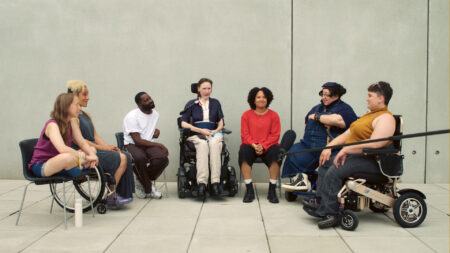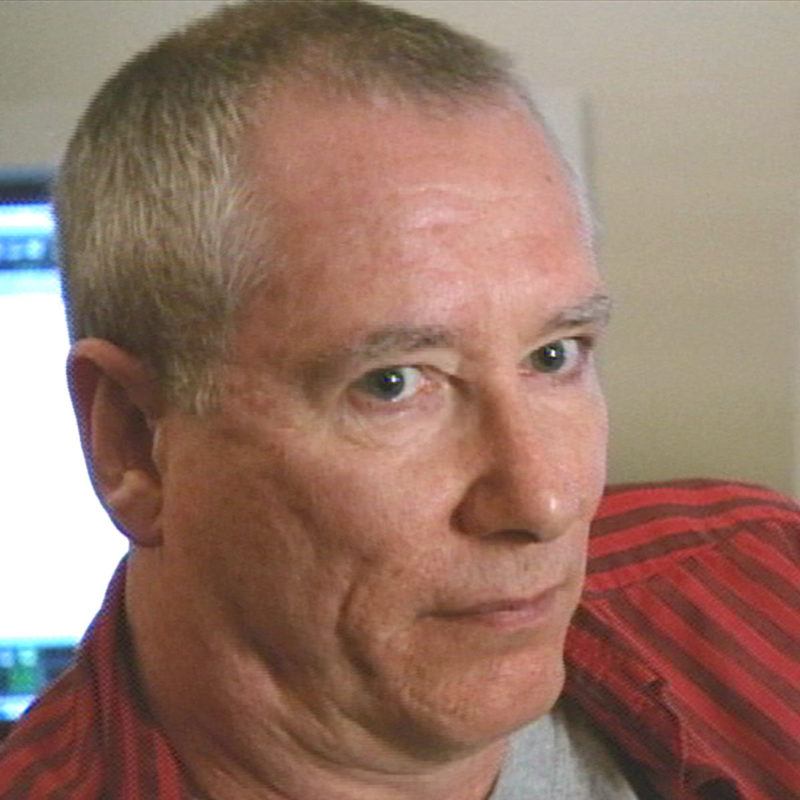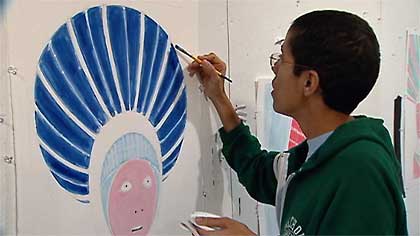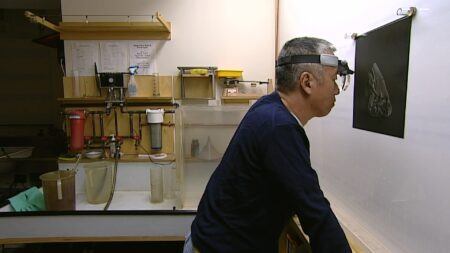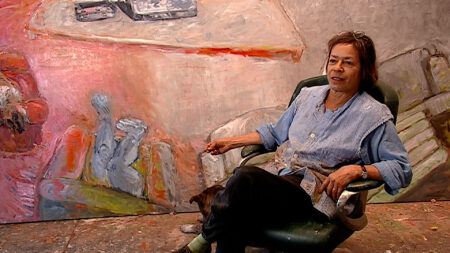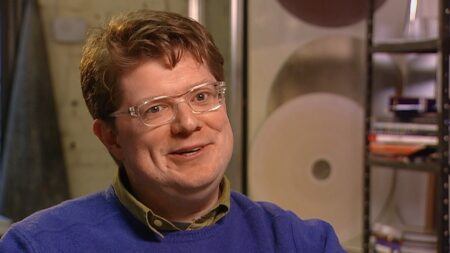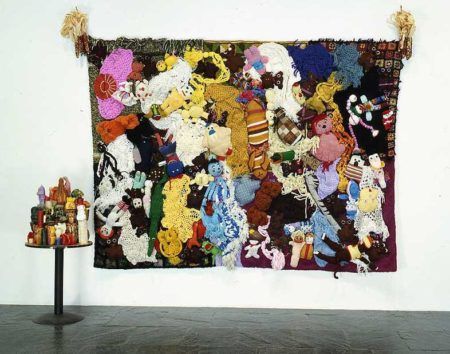Continue playing
(Time remaining: )
Play from beginning
Continue playing "{{ controller.videos[controller.getVideo(controller.currentVideo)].segmentParentTitle}}"
{{controller.videos[controller.getVideo(controller.currentVideo)].title}} has ended.
Mike Kelley in "Memory"
In a body of work that includes sculptures, performance, and installations, Mike Kelley explored contemporary culture’s obsession with repressed trauma. Many of Kelley’s projects drew on his own memory. “Educational Complex,” he said, “is a model of every school I ever went to plus the home I grew up in, with all the parts I can’t remember left blank.”
That project led Kelly to create a performance/video called Day is Done, which was originally conceived to consist of 365 tapes, one for every day of the year. In scenes that he wrote, directed, and scored, Kelley drew on yearbooks to re-stage high school rituals with surreal elements, such as donkeys, devils, and eerie music in a student-body assembly.
Credits
Created by: Susan Sollins & Susan Dowling. Executive Producer & Curator: Susan Sollins. Series Producer: Eve-Laure Moros Ortega. Associate Producer: Migs Wright. Assistant Curator: Wesley Miller. Production Manager: Alice Bertoni. Production Coordinator: Kelly Shindler. Producer: Charles Atlas. Editor: Lizzie Donahue. Host: Isabella Rossellini. Director of Photography: Takahisa Araki, Norbert Arnsteiner, Martial Barrault, Kurt Branstetter, Bob Elfstrom, Mead Hunt, Nancy Schreiber, Joel Shapiro, & Dyanna Taylor. Sound: Tom Bergin, Ray Day, Lori Dovi, Jim Gallup, Stacy Hruby, Gary Silver, Jean-Pierre Vial, Ullrich Vlasak, & Merce Williams. Gaffer: Todd Csernecky, Lamar Bloodworth, Ted Hayash, & Mike Lamb. Grip: Michele De Lorimier & Darryl Miller. Assistant Camera: Sean Brown, Marie Chao, Brian Hwang, Kipjaz Savoie, Dave Wightman, Lievan van Hulle, & Yahia Zadek. Production Assistant: Xavier Ballandras, Larry Fojtik, Michaela Hoeck, Kathy Kniss, Justin Leitstein, Mary Jo Mauro, Alexei Van Mourik, Scott Resnick, & Rob Zalkind. Assistant Avid Editor: Robert Achs, Jamie Courville, Sean Frechette, Mike Heffron, David Kreger, Cara Leroy O’Connell, Joaquin Perez, Aaron Sheddrick, & Lynn True. Still Photography: Alice Bertoni & Bob Elfstrom.
Creative Consultant: Ed Sherin. Art Design & Animation: Open, New York. On-Line Editor: Don Wyllie & Frame:Runner NYC. Composer: Peter Foley. Voice-Over Artist: Jace Alexander. Sound Editing: Margaret Crimmins, Greg Smith, & Dog Bark Sound. Sound Mix: Tony Volante & Sound Lounge. Animation Stand: Frank Ferrigno & Frame:Runner NYC. Introductory Host Segments Created by: INTERspectacular. Commissioned Video Art by: Teresa Hubbard / Alexander Birchler.
Artworks Courtesy of: Mike Kelley; Josiah McElheny; Susan Rothenberg; Hiroshi Sugimoto; © 2005 Susan Rothenberg / Artists Rights Society (ARS), New York; © 2005 Artists Rights Society (ARS), New York / ADAGP, Paris / Succession Marcel Duchamp; Des Moines Art Center; Electronic Arts Intermix; Jablonka Galerie, Köln; Metro Pictures, New York; Sperone Westwater, New York; & Donald Young Gallery, Chicago. Archival Footage Courtesy of: Artist Network Pictures/Takahisa Araki.
Special Thanks: Gen Aihara; The Art21 Board of Trustees; Tatiana Bliss; Hervé Chandès; Linda Chenit; Fondation Cartier pour l’art contemporain; Curious Pictures; Michael Davis Stained Glass; Bernhard Fleischer; Martha Friedman; Andrea Hall; Achim Hochdörfer; Miani Johnson; Norman Keyes; Tomoko Kimata; Dominic Mercier; Michelle Menotti; Museum of Modern Art, New York; Museum Moderner Kunst Stiftung Ludwig Wien; Karen Polack; Grazia Quaroni; Philadelphia Museum of Art; Anders Rydstedt; Soundtrack F/T; Gregg Stanger; Mary Clare Stevens; Jennifer Tobias; Valley Plaza Recreation Center, North Hollywood; & Lisa Williamson.
Director of Education & Outreach: Jessica Hamlin. Director of Development: Kathi Pavlick. Development Associate: Sara Simonson.
Interns: Susan Agliata, Nathan Townes-Anderson, Hannah Blumenthal, Agnes Bolt, Lisa Charde, Mary Chou, Kate Crawford, Amanda Donnan, Sophie Dunoyer de Segonzac, Suzy Foster, Jules Gaffney, Katie Hen, Heather Hughes, Adam Krakowski, Georgia Kung, David Mark Kupperberg, Maiko Kyogoku, Phil Logan, Lisa Margulies, Michelle Maydanchik, Carla Meyers, Christine Miller, Geoffrey Pan, Sujay Pandit, Jihan Robinson, Jennifer Sarkilahti, Megan Scally, Karen Seapker, Greg Shilling, Sarah Sliwa, Jennifer Smith, & Elizabeth Swift.
Public Relations: Kelly & Salerno Communications. Station Relations: De Shields Associates, Inc. Legal Counsel: Albert Gottesman. Bookkeeper: Marea Alverio-Chaveco & William Handy.
Major underwriting for Season 3 of Art in the Twenty-First Century is provided by National Endowment for the Arts, PBS, Agnes Gund and Daniel Shapiro, Nathan Cummings Foundation, Corporation for Public Broadcasting, Jon and Mary Shirley Foundation, Bagley Wright Fund Bloomberg, The Horace W. Goldsmith Foundation, JPMorgan Chase, Melva Bucksbaum and Raymond Learsy, The Paul G. Allen Family Foundation, and The Andy Warhol Foundation for the Visual Arts.
Closed captionsAvailable in English, German, Romanian, Italian, Japanese, Korean, Chinese, Italian
Through the Art21 Translation Project, multilingual audiences from around the globe can contribute translations, making Art21 films more accessible worldwide. Translate this video now.
Interested in showing this film in an exhibition or public screening? To license this video please visit Licensing & Reproduction.
Mike Kelley’s work ranges from highly symbolic and ritualistic performance pieces to arrangements of stuffed-animal sculptures, to wall-size drawings, to multi-room installations that restage institutional environments (schools, offices, zoos), to extended collaborations. His work questions the legitimacy of “normative” values and systems of authority, and attacks the sanctity of cultural attitudes toward family, religion, sexuality, art history, and education. He also comments on and undermines the legitimacy of the concept of victim or trauma culture, which posits that almost all behavior results from some form of repressed abuse. Kelley’s aesthetic mines the rich and often overlooked history of vernacular art in America, and his practice borrows heavily from the confrontational, politically conscious, “by all means necessary” attitude of punk music.
Mike Kelley
Mike Kelley
